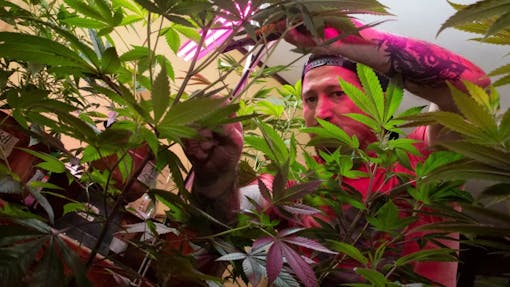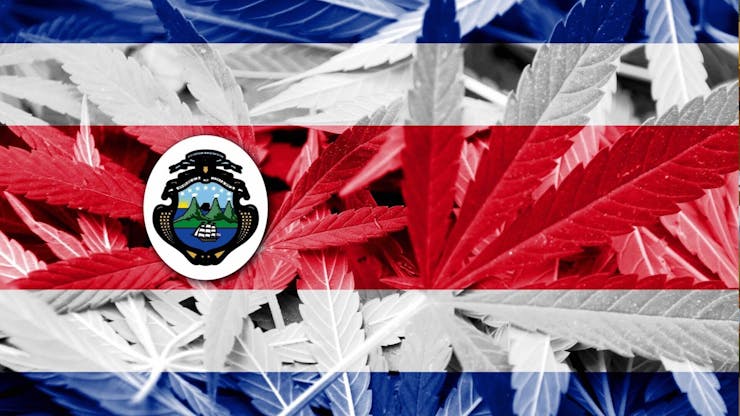Recreational weed is still prohibited, but that could also change soon.
On Tuesday, Costa Rica joined the growing list of nations allowing medical access to cannabis. The law (Expediente 21.388) also allows for the production and processing of hemp plants, but it does not allow or regulate recreational use. Recreational cannabis remains prohibited in most of Latin America, except Uruguay, which became the first country in the world to legalize adult use in 2013.
Costa Rica joins the following Latin American countries in allowing medical marijuana: Argentina, Brazil, Chile, Colombia, Ecuador, Mexico, Panama, Paraguay and Peru.
1.7 million tourists visit the country per year, mostly from the United States and Canada. The industry pulls in about $1.7 billion US dollars per year thanks to thrilling eco-tourism and gorgeous tropical views. Both lawmakers and citizens believe the more welcoming approach to weed will boost tourism and agriculture across the nation—but the new law does not address the question of whether medical marijuana cardholders from other nations will be permitted to possess or purchase medicine in Costa Rica. Detailed guidelines for applying to be a medical marijuana patient are expected as soon as May.
Overcoming Presidential resistance to medical marijuana
Costa Rica’s medical bill had a long road to ratification. President Carlos Alvarado vetoed an earlier version in January, citing the need for individual cultivation and consumption limits.
President Alvarado is on his way out of office later this year. And both of the candidates battling to replace him are strongly in favor of recreational cannabis. Presidential hopefuls José María Figueres and Rodrigo Chaves will compete in a runoff election April 3.
A recreational bill has been sitting in Costa Rica’s Congress since last April and appears imminent. That may be why the current President finally budged on the medical bill. After signing, he admitted that legalization would be “of great benefit to Costa Rica.” Since Costa Rica does not allow presidents to serve consecutive four-year terms, he has no reason to lie.
President Alvarado may have also been moved by the outcry to his initial resistance. The blowback included a tearful cancer patient whose online video about regaining her appetite and walk again resonated nationwide. But even as he vetoed past versions of the bill, the President insisted he was in favor of a well-regulated industry.
Here’s what Costa Rica’s new medical marijuana bill allows
- The law covers cultivation, harvesting, processing, storage, and transport of medical marijuana and hemp. The Minister of Agriculture will regulate the hemp market.
- The Minister of Health will regulate the medical cannabis market.
- Costa Ricans who want medical cannabis access will need a permit. Guidelines for applying will be available by May 2022.
- Those who cultivate medical marijuana will need to register with the appropriate national health institutions. They must also comply with random and routine inspections by the Costa Rica Drug Institute (ICD).
- All hemp components are legal for food and industrial purposes.
- Hemp products must test at under 1% THC.
- The new law does not address any regulations for tourists with medical licenses from their home countries. Further details could be available by May.
- Tracing systems will be gradually implemented to track products throughout the entire production chain, from seed to sale.
- Home cultivation will not be allowed, thanks in part to President Alvarado’s January veto. Alvarado feared substance abuse and illicit enterprises. Before signing, the President insisted that all medicinal cannabis be grown in a professional laboratory and be prescribed by a doctor.
- Unlicensed cultivators could face six to twelve years in prison for illegal cultivation or sale of the plant.
- Tax fees collected by the Ministry of Agriculture and Livestock, and the Ministry of Health will be fully reinvested in national agencies, law enforcement, and compliance oversight.
- License fees will be proportional to the size and nature of the business.
- Permits for research activities will be available through the Ministry of Health, with access and terms to be determined by the nature of the research.
- Cultivation and business licenses will be valid for six years, but can be renewed after a review period.
- Only one license for cultivation and one license for business per citizen.
Read the full bill here.
How the pandemic impacted legalization in Costa Rica
The global response to COVID-19 hit Costa Rica’s tourism-dependent economy particularly hard. The industry saw 2 million fewer international visitors in 2020 than 2019. While quality of life for residents was a primary factor for lawmakers considering Expediente 21.388, the potential revenue the country could make up in exports and tourism was frequently highlighted as a pro of legalization.
In 2019, Costa Rica received 3,139,008 international visitors through all modes of entry, of which 1,666,571 were from North America, while in 2020, Costa Rica received 1,011,912 international visitors, of which 571,010 were from North America.
– Costa Rica’s Minister for Tourism, Gustavo Segura Sancho
With a national workforce of about 211,000 people directly employed by the tourism industry, and capacity for over three million visitors per year pre-pandemic, the country is searching for ways to cushion the massive losses taken since 2020.
Experts estimate a 70% drop in tourism demand. According to the Central Bank of Costa Rica’s data, the national GDP decreased by 4.5% in 2020, driven mostly by a 40.7% drop in business for hotels and restaurants.

The race to become the world’s top weed destination
Procromer, Costa Rica’s trade promotion and exports group, wants a piece of the global cannabis market’s $5.7 billion annual revenue. The group has been lobbying for legalization for years citing opportunities for investment, employment, and improved quality of life for citizens. They project the world cannabis market will be worth $35 billion a year by 2025.
On his way out of office, President Alvarado remains outspoken about his support for industrial hemp in particular. He says he is confident that “it will help agricultural production and economic recovery.” But he and other officials are still weary of letting the legal industry grow out of control.
The President justified his January veto with concerns that home growing of high-THC plants legal would be hard for authorities to regulate. He and others feared that home cultivation could lead to widespread substance abuse, while providing cover for illicit producers.

Zoila Rosa Volio Pacheco, the lawmaker behind the bill from the start, has assured skeptics that legalization in Costa Rica would not cause a spike in national drug use. And the global data backs up her claim. Studies show that nations that use legalization and harm reduction perform better at preventing drug abuse than nations that take a “War on Drugs” approach.
Costa Rica’s progress on cannabis dates back to 2016, when attorney Mario Alberto Cerdas Salazar was arrested and charged with drug trafficking at his home in the city of Alajuela. He was an early advocate for the plant, and publicly protested for his right to grow and use medical marijuana.
The Judicial Investigation Organism (OIJ—Costa Rica’s FBI) said they found enough cannabis on his property “to make 5,000 cigarettes,” or roughly “170 plants.” But the OIJ couldn’t prove that the cannabis was meant for sale.
Judge Carolina Leitón gave a historic ruling that helped set that scene for today’s legalization push. She ruled, “Yes, marijuana cultivation is illegal; nonetheless, it is not a crime if it is not utilized for sale.”
Cerdas Salazar was cleared of the charges, scoring the first big legal win for Costa Rican cannabis lovers. His case and the new medical law give hope that expanded access and adult-use bills will soon be a reality for tourists, ticas, and ticos nationwide.





